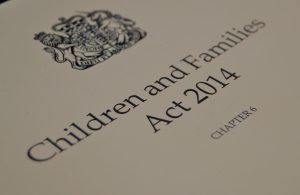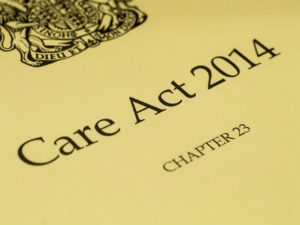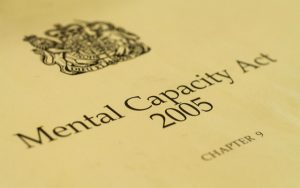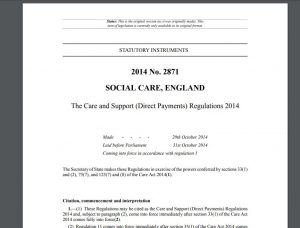Legislation and Policy
It is always helpful to be aware of your legal rights and how to use them, there are some useful pieces of legislation and guidance that you should familiarise yourself with, click on the links below to read more about the law:
The Care Act 2014, on these pages you can find out useful things you should know about the Care Act and the responsibilities local authorities have regarding; assessment, eligibility decisions, entitlement to Personal Budgets, and choice and control.
The Children and Families Act 2014

The Children and Families Act 2014 has 10 parts to it, but Part 3 is relevant to children and young people in England with special educational needs or disabilities. It covers education, health and care provision
The Mental Capacity Act 2005 The Act aims to empower and protect people who may not be able to make some decisions for themselves. It also enables people to plan ahead in case they are unable to make important decisions for themselves in the future.
The Care and Support (Direct Payments) regulations 2014
The Care and Support (Direct Payments) Regulations 2014 this guidance associated with the Care Act, it covers needs and eligibility assessment, charging and financial assessment, person-centred care and support planning, adult safeguarding, integration and partnership working and inter-local authority issues. The regulation covers 18 areas, but our page looks at the Direct Payments element of the regulations.
The National Framework for NHS Continuing Healthcare and NHS-funded Nursing Care
The National Framework for NHS Continuing Healthcare and NHS-funded Nursing Care sets out the principles and processes for deciding eligibility. The 2022 National Framework is intended to provide greater clarity to individuals and staff, to reflect legislative changes since the 2018 incorporating the Health and Care Act 2022 and to clarify a number of policy areas, including: Strengthening NHS Continuing Healthcare assessments, Clarifying when consent and informed and active participation should be sought throughout the NHS Continuing Healthcare process, Providing clearer guidance on 'best interests' decision-making in NHS Continuing Healthcare and Providing additional advice on resolving interagency disputes.
Personal Health Budget (PHB) Quality Framework
Personal Health Budget (PHB) Quality Framework is designed to support integrated care boards to create the conditions to meet PHB performance expectations, with a focus on improving operational delivery to deliver high quality care, improve the experience of PHB holders, realise the ‘life changing’ outcomes that PHBs can deliver, develop workforce confidence in commissioning and delivering PHBs and ensure value for money. The framework should support the four aims of ICSs to improve outcomes in population health and health care, tackle inequalities in outcomes, experience and access, enhance productivity and value for money and help the NHS support broader social and economic development.
Things your local authority should have told you about the charging for your care?
Key Messages check list We have produced an overview of the law on charging, how it sits within the Care Act 2014 and some things you need to know about the financial assessment. It explains the Minimum Income Guarantee (MIG) and Disability Related Expenses (DRE). Inclusion London have kindly provided an example letter template to use with your local authority to request a financial assessment to review your social care charges.
Charging for Social Care... a tax on the need for support?
Charging for Social Care - A tax on the need for support? The Independent Living Strategy Group recently carried out a study of local authority charges for social care, exploring in particular whether and to what extent the practice of charging is undermining people's wellbeing, the primary purpose of social care services as set out in the Care Act 2014. We examined some key features of the way local authorities implement charges and gathered evidence on the impact of charges on disabled people. Our study comprised of two parts: an online survey of more than 600 people who had received a community care assessment; and a Freedom of Information request to 152 English local authorities.
Payment cards in Adult Social Care
Payment cards in Adult Social Care In Control has researched and authored a new report for the Independent Living Strategy Group (ILSG). Based on Freedom of Information returns from all English councils with statutory social services responsibilities, the report reveals major concerns about payment card practice and makes recommendations on how councils can properly comply with Care Act guidance. The investigation was sparked by the experience of a member of the ILSG who had to fight hard to realise her rights to a choice over how her direct payment was managed. Many similar experiences have been reported to the group, leading it to decide a full investigation of council practice was warranted. This was undertaken on the group's behalf by In Control.








